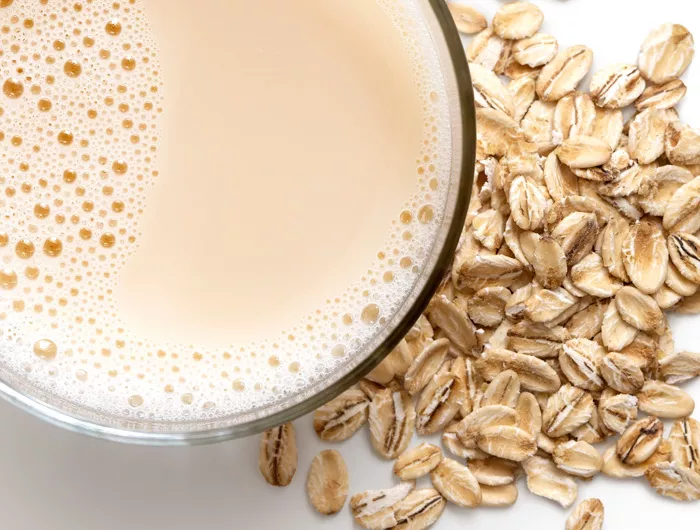
Moving Moment - stock.adobe.com.
Our chart of plant milks
Best Bites (✔✔ ) and Honorable Mentions (✔) have no more than 1 teaspoon (5 grams) of added sugar and 1.5 grams of saturated fat, and at least 2.5 micrograms of vitamin D and 300 milligrams of calcium per cup. (Milks with a superscript “F” have at least 4 grams of sat fat.)
Best Bites also have at least 7 grams of protein and 1.2 mcg of vitamin B-12. The names of all milks with at least that much B-12 have an asterisk (*).
Note: Unless “refrigerated” or “shelf-stable” is specified, numbers for both kinds are the same.
Key
| Soy Milk (1 cup) | Calories | Added Sugar (tsp.) | Vitamin D (mcg) | Calcium (mg) | Protein (g) |
|---|---|---|---|---|---|
| Value: undefinedBest Bite365 Organic Unsweetened Original* | 70 | 0 | 5 | 300 | 7 |
| Value: undefinedBest BiteSilk Organic Unsweet (shelf-stable) * | 80 | 0 | 3 | 300 | 8 |
| Value: undefinedBest BiteSilk Organic Unsweet (refrigerated)* | 80 | 0 | 3 | 300 | 7 |
| Pacific Organic Unsweetened Original | 90 | 0 | 0 | 30 | 9 |
| Value: undefinedBest BiteSilk Original* | 110 | 1 | 3 | 450 | 8 |
| Edensoy Organic Original | 130 | 1 | 0 | 90 | 10 |
| 365 Organic Original* | 100 | 1.5 | 5 | 300 | 7 |
| Silk Vanilla (refrigerated)* | 100 | 2 | 3 | 470 | 6 |
| Silk Chocolate (refrigerated)* | 150 | 3.5 | 3 | 470 | 9 |
| Silk Very Vanilla (refrigerated)* | 130 | 3.5 | 3 | 470 | 6 |
* Contains at least 1.2 mcg vitamin B-12.
Key
| Pea Protein Milk (1 cup) | Calories | Added Sugar (tsp.) | Vitamin D (mcg) | Calcium (mg) | Protein (g) |
|---|---|---|---|---|---|
| Value: undefinedBest BiteRipple Unsweetened Original* | 80 | 0 | 5 | 440 | 8 |
| Value: undefinedHonorable MentionCalifia Protein Oat Original | 140 | 0.5 | 5 | 590 | 8 |
| Value: undefinedHonorable MentionSilk Protein Original | 130 | 0.5 | 2.5 | 450 | 10 |
| Value: undefinedBest BiteRipple Original (refrigerated)* | 90 | 1 | 5 | 440 | 8 |
| Ripple Oatmilk + Protein (refrigerated)* | 150 | 1.5 | 5 | 440 | 6 |
| Silk Protein Chocolate | 150 | 3.5 | 2.5 | 450 | 10 |
* Contains at least 1.2 mcg vitamin B-12.
Key
| Alt-Milk (1 cup) | Calories | Added Sugar (tsp.) | Vitamin D (mcg) | Calcium (mg) | Protein (g) |
|---|---|---|---|---|---|
| Value: undefinedHonorable MentionNotCo NotMilk 2% Reduced Fat | 80 | 0.5 | 4.6 | 300 | 4 |
| Value: undefinedHonorable MentionNotCo NotMilk Whole | 100 | 0.5 | 4.6 | 300 | 4 |
| Silk Nextmilk 2% Reduced FatF* | 90 | 0.5 | 4 | 310 | 4 |
| Silk Nextmilk Whole FatF* | 110 | 0.5 | 4 | 310 | 4 |
| So Delicious Wondermilk 2% Reduced FatF* | 70 | 0.5 | 3.6 | 300 | 1 |
| So Delicious Wondermilk Whole FatF* | 90 | 0.5 | 3.6 | 300 | 1 |
F Contains at least 4 g sat fat. * Contains at least 1.2 mcg vitamin B-12.
Key
| Oat Milk (1 cup) | Calories | Added Sugar (tsp.) | Vitamin D (mcg) | Calcium (mg) | Protein (g) |
|---|---|---|---|---|---|
| Value: undefinedHonorable MentionSilk Unsweet (refrigerated) | 50 | 0 | 4 | 470 | 1 |
| Value: undefinedHonorable MentionPlanet Oat Unsweetened Original | 45 | 0 | 4 | 350 | 1 |
| Value: undefinedHonorable MentionPlanet Oat Unsweetened Vanilla | 45 | 0 | 4 | 350 | 1 |
| Value: undefinedHonorable MentionSilk 0g Sugar (shelf-stable)* | 60 | 0 | 3 | 450 | 1 |
| Chobani Zero Sugar Original | 90 | 0 | 2 | 260 | 1 |
| Elmhurst Milked Oats Unsweetened | 100 | 0 | 0 | 20 | 3 |
| Califia Oat + Almond Blend | 60 | 0.5 | 4.4 | 260 | 2 |
| Three Trees Organic Oatmilk with Seeds | 100 | 0.5 | 4 | 30 | 4 |
| Planet Oat Original (shelf-stable) | 100 | 0.5 | 0.3 | 350 | 2 |
| Planet Oat Vanilla (shelf-stable) | 100 | 0.5 | 0.3 | 350 | 2 |
| Califia Extra Creamy | 110 | 1 | 4.4 | 260 | 2 |
| Value: undefinedHonorable MentionPlanet Oat Original (refrigerated) | 90 | 1 | 4 | 350 | 2 |
| Value: undefinedHonorable MentionPlanet Oat Vanilla (refrigerated) | 90 | 1 | 4 | 350 | 2 |
| Value: undefinedHonorable MentionPlanet Oat Extra Creamy (refrigerated) | 120 | 1 | 4 | 350 | 2 |
| Silk Original (refrigerated) | 120 | 1 | 0.3 | 350 | 2 |
| Silk Original (refrigerated)* | 120 | 1.5 | 4 | 470 | 1 |
| Silk Extra Creamy* | 160 | 1.5 | 4 | 470 | 1 |
| Oatly Low Fat* | 90 | 1.5 | 3.6 | 350 | 3 |
| Oatly* | 120 | 1.5 | 3.6 | 350 | 3 |
| Oatly Barista Edition* | 140 | 1.5 | 3.6 | 350 | 3 |
| Oatly Full Fat* | 160 | 1.5 | 3.6 | 350 | 3 |
| Silk Original (shelf-stable)* | 120 | 1.5 | 3 | 460 | 1 |
| Chobani Vanilla | 120 | 2 | 2 | 130 | 2 |
| Planet Oat Dark Chocolate | 140 | 2.5 | 4 | 350 | 3 |
| Oatly Chocolate* | 150 | 4 | 3.6 | 350 | 3 |
* Contains at least 1.2 mcg vitamin B-12.
Key
| Almond Milk (1 cup) | Calories | Added Sugar (tsp.) | Vitamin D (mcg) | Calcium (mg) | Protein (g) |
|---|---|---|---|---|---|
| Value: undefinedHonorable MentionAlmond Breeze Banana | 80 | 0 | 5 | 450 | 2 |
| Value: undefinedHonorable MentionAlmond Breeze Unsweetened—Original or Vanilla (refrigerated) | 30 | 0 | 5 | 450 | 1 |
| Value: undefinedHonorable MentionAlmond Breeze Coconutmilk Blend Unsweetened Original (refrigerated) | 40 | 0 | 5 | 450 | 1 |
| Value: undefinedHonorable MentionSilk Unsweet Vanilla (shelf-stable) | 30 | 0 | 2.5 | 450 | 1 |
| Silk Unsweet (refrigerated) | 30 | 0 | 2 | 470 | 1 |
| Silk Unsweet Vanilla (refrigerated) | 30 | 0 | 2 | 470 | 1 |
| Silk Extra Creamy Unsweet | 70 | 0 | 2 | 470 | 1 |
| Almond Breeze Unsweetened—Original or Vanilla (shelf-stable) | 30 | 0 | 0 | 450 | 1 |
| Almond Breeze Coconutmilk Blend Unsweetened Original (shelf-stable) | 40 | 0 | 0 | 450 | 1 |
| Three Trees Organic Original | 100 | 0 | 0 | 70 | 4 |
| Malk Organic Unsweetened | 70 | 0 | 0 | 40 | 2 |
| Value: undefinedHonorable MentionAlmond Breeze Extra Creamy | 80 | 1 | 5 | 450 | 1 |
| Califia Extra Creamy | 60 | 1 | 0 | 440 | 1 |
| Califia Barista Blend | 70 | 1 | 0 | 410 | 2 |
| Almond Breeze Original (refrigerated) | 60 | 1.5 | 5 | 450 | 1 |
| Almond Breeze Reduced Sugar Vanilla | 60 | 1.5 | 5 | 450 | 1 |
| Silk Extra Creamy Original | 90 | 1.5 | 2 | 470 | 1 |
| Silk Less Sugar Vanilla | 45 | 1.5 | 2 | 450 | 1 |
| Almond Breeze Original (shelf-stable) | 60 | 1.5 | 0 | 450 | 1 |
| Silk Vanilla (refrigerated) | 80 | 3 | 2 | 470 | 1 |
| Silk Dark Chocolate (refrigerated) | 100 | 4 | 2 | 440 | 1 |
Key
| Cashew, Hemp, Rice Milk (1 cup) | Calories | Added Sugar (tsp.) | Vitamin D (mcg) | Calcium (mg) | Protein (g) |
|---|---|---|---|---|---|
| Value: undefinedHonorable MentionTempt Hemp Unsweetened Coconut | 50 | 0 | 5 | 390 | 2 |
| Value: undefinedHonorable MentionTempt Hemp Unsweetened—Original or Vanilla | 80 | 0 | 5 | 390 | 2 |
| Value: undefinedHonorable MentionSilk Unsweet Cashew | 25 | 0 | 2.5 | 450 | 1 |
| Pacific Hemp Unsweetened—Original or Vanilla | 60 | 0 | 2 | 260 | 3 |
| Elmhurst Milked Cashews Unsweetened | 130 | 0 | 0 | 20 | 4 |
| Rice Dream Organic Enriched Original | 120 | 2.5 | 5 | 280 | 0 |











